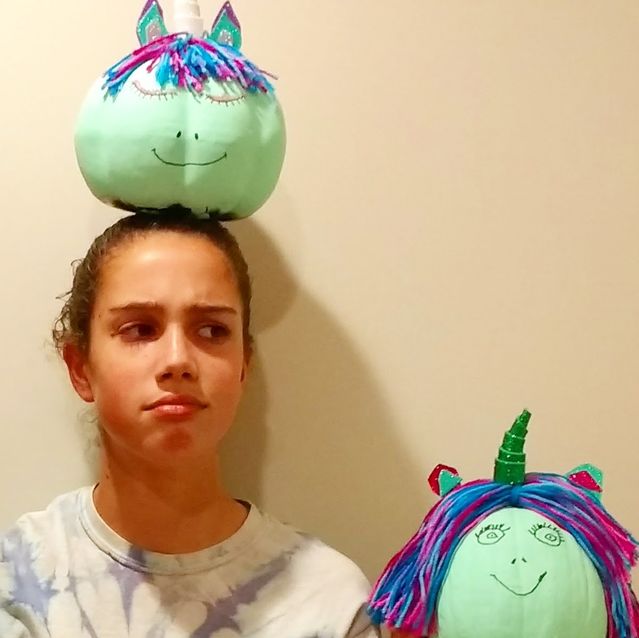THREE WORDS THAT HELPED MY 13-YEAR-OLD STUDY BETTER
Nate Kornell
Juliet was studying for a biology test. I said “Prepare to teach.” It worked.
On Monday, I pulled up in front of my daughter Juliet’s middle school. She hopped in the front seat while three of her seventh-grade friends piled in the back. The energy in our minivan went up about a million volts. As we were driving out of the parking lot and the backseat filled with discussion of who had said what on Instagram, Juliet turned and asked me to help her study for her upcoming science test. She explained that she needed to memorize a chapter about the reproductive cycle of plants.
I immediately launched into a speech about cognitive psychology. I’m annoying in that way. “You know,” I said, “a lot of times memorizing seems like the best way to study, but you actually do better on tests if you work on trying to understand the material.”
Juliet was smart. “Dad, I don’t understand any of it. But I don’t need to, she told us what will be on the test, I just have to memorize the vocabulary.” By the way, she’s getting an A in this class.
I was not to be deterred. “Even if you just need to memorize it, would you try it my way? I can almost guarantee that the material will seem really complicated at the start… well let’s back up, does it seem really complicated right now?”
“Yes, I have no clue and it’s crazy complicated,” she said.
“I pretty much promise that once you understand it’ll be dead simple.”
“Okay, Dad. You gotta help me, though.”
I’d been waiting to hear those words since 1999 when I started doing research on how people study. This was big.
For some reason, Juliet was open to my advice. This is unusual because she’s noticed that I’m a bit of a dingbat. But I guess being an expert on studying gave me some cache. Plus, she’s a dingbat too; here’s a picture of her to prove it.

It was Monday afternoon. We had two nights to study before the test on Wednesday. I proposed a plan. “Tomorrow night, you are going to teach the material to me. Tonight, read the chapter. Prepare to teach.”
Asking her to adopt a teaching mindset was an unusual move but I was compelled to do it by the research I’ve read (and done). Studies show teaching somebody else is a very effective way to learn. Another set of studies show that even if you don’t do the teaching, the act of preparing to teach leads to more learning than just trying your best to learn the material(link is external).
There is also a second reason. Adopting a teaching mindset works especially well when you are trying to understand something. Juliet was studying plant reproduction. There’s a sequence of steps—fertilization, growth, meiosis, and so forth—that makes logical sense. There are familiar terms like egg, sperm, fertilization, fruit, seed, and so on, and they fit like a puzzle with more novel ideas and (for her) like chromosome pairs and meiosis. In other words, it wasn’t about memorization, there was plenty to understand, and she did not understand it yet.
Why does adopting a teaching mindset work? We don’t really have data on this question, but here’s some speculation. As the teacher, you want to focus on what’s most important, so you try to figure out what the main points are. This requires thinking deeply about the content. It’s very different than memorization. You also try to think about the order (what should you talk about first, second, etc.) which requires organizing your thoughts. You want to make your explanation logical, so you try to understand why things are the way they are. You want to be ready to answer questions, so you ask yourself questions as you study and try to fill in the gaps in your knowledge. Upon reading this list of benefits, a typical memory researcher’s face will be stained with tears of joy.
The “magic” of the teaching mindset is that a simple instruction does so much. If I told Juliet, “Focus on meaning, think about why things are the way they are, organize your thoughts, and be prepared to answer questions,” it wouldn’t help her. She would not know what concrete steps to take. Neither would I. But when she hears those three words, “prepare to teach,” she knows what to do. All of this good happens naturally.
The timing was important. I wanted Juliet to spend Monday evening preparing to teach and Tuesday teaching me. So I made sure I told her this plan before Monday evening rolled around.
Tuesday afternoon
It is 4:00 pm. I am doing dishes in preparation for dinner. Juliet sits down at the kitchen island, plops her science book down facing me, and says “Okay Dad, let’s study.”
I wanted her to teach me. But false starts happen. If I was too rigid or critical, it would have killed a good thing we had going. So instead we started with me asking her (my teacher) some simple questions. She knew some but not others. When she didn’t know the answers I encouraged her to check the book.
It turned out she wasn’t ready to teach yet, and she quickly realized it. The miracle was how she dealt with it. She knew what she was getting wrong. She started checking things that didn’t make sense. And she was actively seeking to test her understanding. I was happy to see it!
At one point, I asked, “So if this is true, does that mean anything with a seed is a fruit?”
She thought about it and said, “That can’t be right, that would mean a cucumber is a fruit.”
“Alexa, is a cucumber a fruit?” I asked. She (our Amazon Echo) answered back that it was.
“Weird!” Juliet said.
It was great. Nothing like a little hypothesis testing to warm a father’s heart. Plus, it was a memorable lesson about plant reproduction. And who knew cucumbers are fruit?!
Something deeper was going on. She wasn’t memorizing, she was trying to make sense of things, which is exactly what I had hoped she would do.
We talked through plant reproduction for half an hour, then I had to go out for a dinner with friends and a swim team drop off/pickup for Kai. At that point, were still both pretty confused. But she said she’d be ready to teach me when I got home.
Tuesday night
When I got home, I went upstairs and sat down at Juliet’s desk. It was about 8:00 pm. I had her book in front of me. She sat on her bed, where she couldn’t see the book and started talking. And she explained everything.
She told me there was a figure at the start of the chapter that laid out the reproductive cycle of all plants, and we realized that all of the other life cycles, which had seemed so random and confusing at 4:00 pm, were just versions of that first figure. In retrospect, it seemed obvious. Other things just seemed to fall into place. Like, for example, in seedless plants, you skip the part of the cycle where the seed is formed. Turns out not to be very confusing.
When I sat down that night I had honestly been at a total loss for what was going on. Now plant reproduction was not baffling at all—at least, not anymore. Initially, I had promised this would happen—that if she took my advice, it would all seem pretty simple in the end—and I was thrilled that it was actually true!
We spent about 15 minutes in that last study session. And then we were done. Bedtime.
What I did right as a parent
I recognized the type of material being studied. When there’s a logical system that can be understood, you should focus your effort on understanding. This will seem slower than memorization. And more frustrating (or even impossible). But it creates its own momentum and in the end, it’s often faster. It’s also more effective and the memories last much longer. Studying this way also pays off down the line. It serves as a framework for whatever you’re going to learn next. It is so worth it. Although this is a great method in some circumstance it’s not always the best way; sometimes there’s no logic to the material, and memorization is appropriate. For example, when learning which ancient king built which temple, there’s nothing to understand, and memorization will often work better. As a parent (or student) it’s important to recognize the difference. Try to understand when you can and memorize the rest.
I told her she’d have to teach the material to me. If I had said “think about what the material means, how it all fits together, and why it is the way it is” I’m pretty sure none of this would have worked. Secretly, that’s what I wanted her to do, but those aren’t instructions that your average person can follow. Telling her to prepare to teach the subject made perfect sense to her. It helped her put her effort toward understanding.
I was flexible. At first, she was trying to explain things but she couldn’t do it. That was fine. I didn’t expect her to have mastered the material yet, that’s why we were studying! I encouraged her to continue her process. I didn’t force her to do anything. I was never disappointed with anything she did. I had high expectations for the final product, but we went at her pace and I was just there to help. And I was being honest about being her student. I literally wanted to learn from her.
What Juliet did right as a student
She asked for help and tried my suggestions. There’s no way to make her do this. When she is ready, she will ask. I just tried to do it her way so she’ll ask again next time. If she knows every time she asks for help I end up criticizing her, or it’s a negative experience in some way, she won’t ask again, though, so I tried to do it on her terms and help her reach her goals, not my goals.
She responded well to setbacks. When she didn’t understand, she recognized what didn’t make sense and sought to understand it.
She stayed motivated. For most kids, and for most adults, this is the hardest part of studying. The fact that she’s intrinsically motivated makes everything else so much easier.
Final words
I can’t take credit for anything Juliet did. But together, we made it work.
Every kid is different, of course. Although “learning styles” have been debunked, it’s still true that some things work better for one kid, others work for another. But there are also some common principles. Understanding the material works for everyone. So if your child is studying something where understanding is possible, try telling her to “prepare to teach” and see what happens. Maybe it will work for your family too.
By the way, Juliet edited this essay for me. “Otherwise,” she said, “it would have sucked, Dad.”
References
Nestojko, J. F., Bui, D. C., Kornell, N., & Bjork, E. L. (2014). Expecting to teach enhances learning and organization of knowledge in free recall of text passages. Memory & Cognition, 42, 1038-1048. doi:10.3758/s13421-014-0416-z



